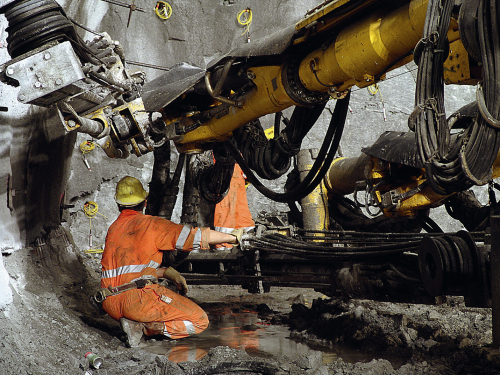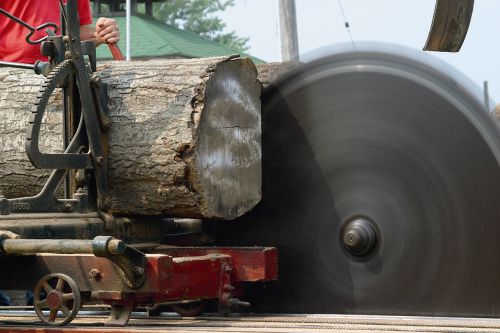


With significant advances in lubricant technology, there is a great deal of evidence that environmentally considerate products now offer a level of performance that is equal to their mineral-based lubricant counterparts. Compromised per-formance and increased cost are no longer issues when making the change to environmentally considerate lubricantslu
A lubricant for use in an environmentally sensitive area should combine a number of important properties. These include high biodegradability, which means it is rapidly removed from the environment by natural processes in the event of a leak or spill, and low ecotoxicity, meaning reduced toxic impact on the environment. Applications for such lubricants include machinery operating in sectors such as forestry, agriculture, mining, construction, earth-moving, marine and water treatment.
Performance issues
Environmentally considerate hydraulic fluids have been on the market for more than 20 years and a wide range of fluids are available for pump machinery that offer different levels of performance. When questioned on the subject, most users will say that they are keen to convert to environ-mentally considerate products, if there is no compromise on performance or price. Historic problems associated with environmentally considerate lubricant performance have tended to hold back widespread adoption, but these have now been resolved. For example, many of the reported field problems associated with the use of environmentally considerate hydraulic fluids, such as short service lives, loss of fluidity at low temperatures and excessive foaming, can be attributed either to the use of a fluid with a poorly balanced technical profile, or cross-contamination with the previously used mineral oil.
Performance is obviously a key issue and effective lubrication of pumps plays a major role in maximizing productivity. For example, Sweden's Forestry Engineering Group sets challenging criteria for the operational performance of its equipment. Forestry machinery is required to provide a service life of 20 000 hours and service intervals are to be kept to a minimum. The organization attributes half of all downtime to faulty hydraulic systems. Similar demands are made across many industries and all specified objectives and requirements must be taken into account in new system designs. A crucial component in guaranteeing required performance is the lubrication.
Shell's role
As part of Shell's commitment to sustainable development, the company has developed and promotes the use of lubricants designed to reduce the impact on the environment. The line of environmentally considerate products developed by Shell includes Shell Naturelle HF-E for hydraulic systems and Shell Naturelle Grease EP. These products have proved to be successful in lubrication performance whilst also reaching the highest environmental standards for biodegradability and low ecotoxicity.
Successful field trials
Extensive field trials, carried out on a range of equipment – including pumps – working in varied industrial applications, have provided impressive results. For example, Hitachi has approved Shell Naturelle HF-E 46 for use in all types of its heavy earth-moving excavators. The approval, the first for this lubricant in Japan, followed a series of successful field trials in which the lubricant demonstrated good stability and excellent anti-wear properties in severe test conditions. Shell Naturelle HF-E 46 also passed laboratory tests for seal compatibility and frictional properties. As a result, Hitachi has recognized that this product is capable of more than 2000 hours of use in the field without fluid change.
In another trial, the same lubricant was tested for use in dam gates at a hydroelectric power station operated by The Electricity Corporation of New Zealand (ECNZ). The company operates intake and control gates using hydraulic systems with large volumes of fluid that, in the event of a spill, could cause large-scale contamination of the waterways. The hydraulic system on the central gate was filled with 900 litres of Shell Naturelle HF-E 46 and trialled over an initial 12-month period.
There was no physical degradation of the fluid over the duration of the trial and it was shown that a service life of at least ten to 15 years should be achievable. The fluid showed full compatibility with existing equipment, with no wear detected on the pump when it was stripped down. There was no deterioration of the hydraulic system seals during the trial. As a result, Shell Naturelle HF-E 46 was deemed to be suitable for use in the ECNZ hydraulic gate systems.
Careful changeover
It is important that the change to environmentally considerate lubri-cants is carried out in a carefully controlled way to avoid any cross-contamination with mineral oil. To avoid these problems, when Shell is running a field trial, the fluid changeover involves draining the machines when warm, and emptying and bypassing the cylinders. Three flushes are performed and the machines are run between each one. As well as preventing cross-contamination, this also helps to maintain the environmental acceptability of the fluid in the pumps. New filters are fitted and in some cases new test pumps, which have been stripped, weighed and photographed to allow accurate analysis after the trial. Throughout the trials, test fluids are monitored for condition and contamination. Wear metals are carefully analysed throughout.
Composition and properties
All of the environmentally considerate lubricants produced by Shell are formulated using carefully selected unsaturated and saturated synthetic esters, or advanced technology rapeseed oil. This prevents the problems of poor stability and loss of low-temperature fluidity associated with older products based on vegetable oil or low-quality, unsaturated esters. Optimized additive packages are used to give good extreme pressure and anti-wear performance, corrosion protection and oxidative stability, whilst still maintaining environmental acceptability.
When compared directly with mineral-oil-based lubricants, environmentally considerate lubricants may appear to be more expensive and to not demonstrate significant benefits to the end user. However, when these alternative lubricants are applied and used correctly, operating lifetimes are highly impressive, offering an effective way of improving performance and environmental compliance. Recent statistics show that environmentally considerate products account for only 2% of lubricant sales in Europe, but significant growth in market share is likely as application techniques and ultimate benefits become more widely understood.



